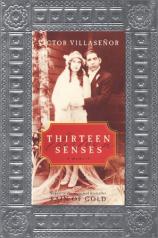Thirteen Senses: A Memoir
About the Book
Thirteen Senses: A Memoir
One of the most profound moments of insight in Thirteen Senses - a family memoir filled with many such moments - concerns the attempted suicide of an Anglo farmer who has lost his crop and with it all of his savings. Salvador Villaseñor can't believe that a man would kill himself just because he has lost everything. "Most of us live our whole life with having nothing!" observes Salvador. But his brother-in-law, Victoriano, explains: "Among the gringos, most of their lives they've always had something, so nothing is something that they know nothing about."
It is the end of the 1920s and Southern California is rapidly growing into a major agricultural and multicultural center. Among the many hardworking immigrants that have settled in the area are the newly married Salvador and Lupe and their families. The young couple is basking in the intoxicating happiness of young love, but they have many truths yet to discover: about marriage, commitment, responsibility, and about each other. Both husband and wife come from a legacy of heroic suffering, having escaped Mexico during the revolution, and both have endured the privation, racism, and hard luck that most immigrants encounter in their adopted homeland. But Salvador and Lupe share another legacy as well - the incredible strength and wisdom of their mothers, Margarita and Guadalupe. Margarita, especially, seems to possess the kind of enormous power that comes from having stared death in the eye, from having survived so much disaster that every day becomes a blessing. It is she who guides her son and "daughter-in-love" through the treacherous waters of marriage, helping them to understand that together they are stronger than they are apart, and teaching them how to tap the inner resources of their souls so they may see beyond the here and now.
With humor and compassion Victor Villaseñor, author of the bestselling Rain of Gold, follows his young parents as they make their way in a precarious world. Salvador's bootlegging career allows him the luxury of ready cash, but it is also a dangerous way of life, one that could land him in jail at any moment. There are relatives to deal with, from Domingo, Salvador's hotheaded brother, to Carlota, Lupe's somewhat obnoxious sister. And there is the Depression, which threatens the countryside with widespread poverty and crime and ultimately forces Salvador and Lupe to leave their families to flee for Mexico.
Throughout this life, money comes and goes, but the love for one's family and God never wavers. Whether they are stranded in the Arizona desert with little water and a broken-down truck or feasting on freshly killed goat at an impromptu family barbecue; whether they are screaming at each other with bloodthirsty wrath, or blissfully wrapped in each other's arms, Salvador and Lupe never question the value and richness of life. As Lupe explains, some people don't know "how to be poor of purse, but rich of Heart. . . All families see hard times. That's just part of la vida."
In a world where materialism and ambition can leave us feeling isolated, it is easy to spout platitudes about the power of love and the importance of family. But Lupe and Salvador's life together is a living testament to these truths. Their story is one of passion, heartache, hard work, disappointment, elation, anger, injustice, and forgiveness. It is a story that adds much to the greater story that is America's.
Thirteen Senses: A Memoir
- Publication Date: August 21, 2001
- Hardcover: 528 pages
- Publisher: Rayo
- ISBN-10: 0066210771
- ISBN-13: 9780066210773



